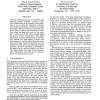Free Online Productivity Tools
i2Speak
i2Symbol
i2OCR
iTex2Img
iWeb2Print
iWeb2Shot
i2Type
iPdf2Split
iPdf2Merge
i2Bopomofo
i2Arabic
i2Style
i2Image
i2PDF
iLatex2Rtf
Sci2ools
138
click to vote
IJCAI
1989
1989
Goal Ordering in Partially Ordered Plans
Partially ordered plans have not solved the goal ordering problem. Consider: a goal in a par tially ordered plan is an operator precondition that is not yet achieved; operators, orderings and variable bindings are introduced to achieve such goals. While the planning community has known how to achieve individual goals for some time, there has been little work on the prob lem of which one of the many possible goals the planner should achieve next. This paper argues that partially ordered plans do not use fully address the goal-ordering problem and then presents a heuristic called temporal coherence which does. Temporal coherence is an ad missible heuristic which provides goal-ordering guidance. Temporal coherence is admissible in the sense that if a solution exists in the plan ner's search space, then there will be a series of goal achievements permitted by the heuristic which can produce this solution.
Related Content
| Added | 07 Nov 2010 |
| Updated | 07 Nov 2010 |
| Type | Conference |
| Year | 1989 |
| Where | IJCAI |
| Authors | Mark Drummond, Ken Currie |
Comments (0)

